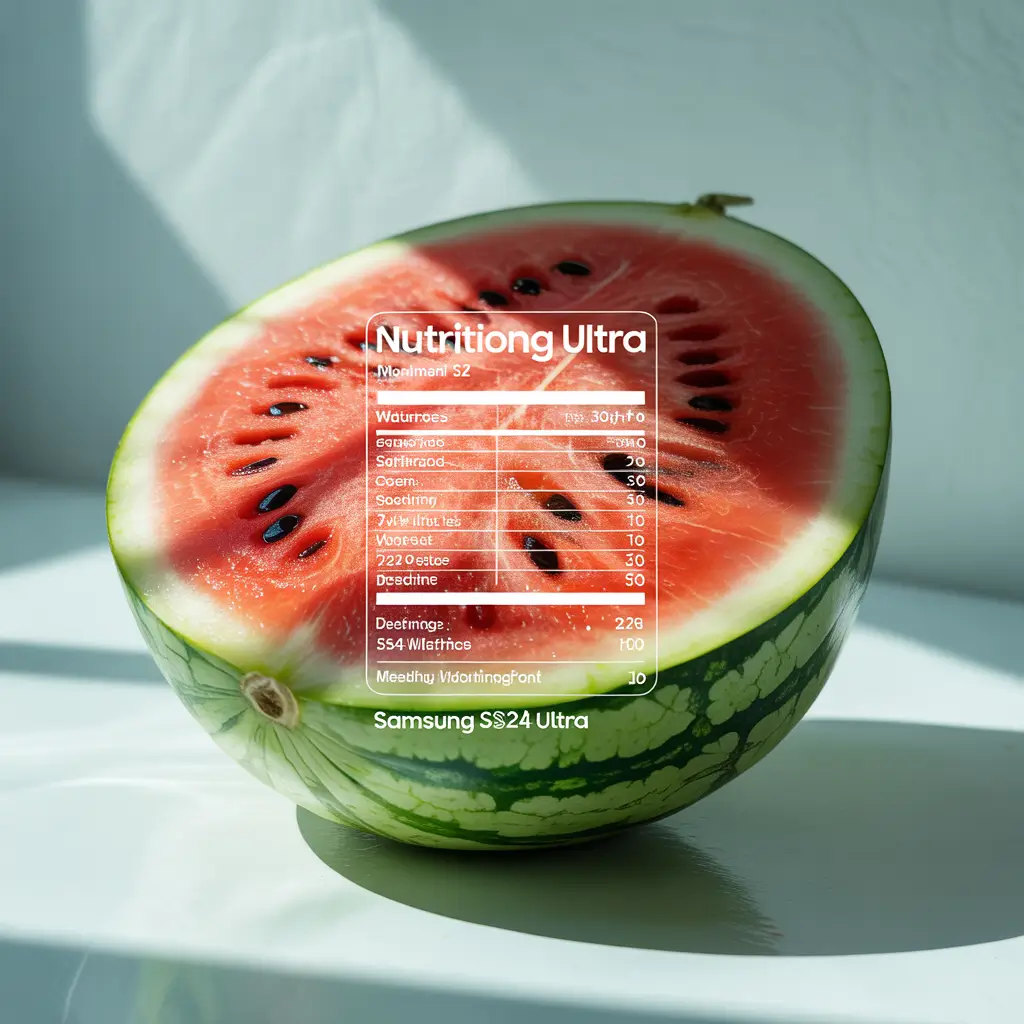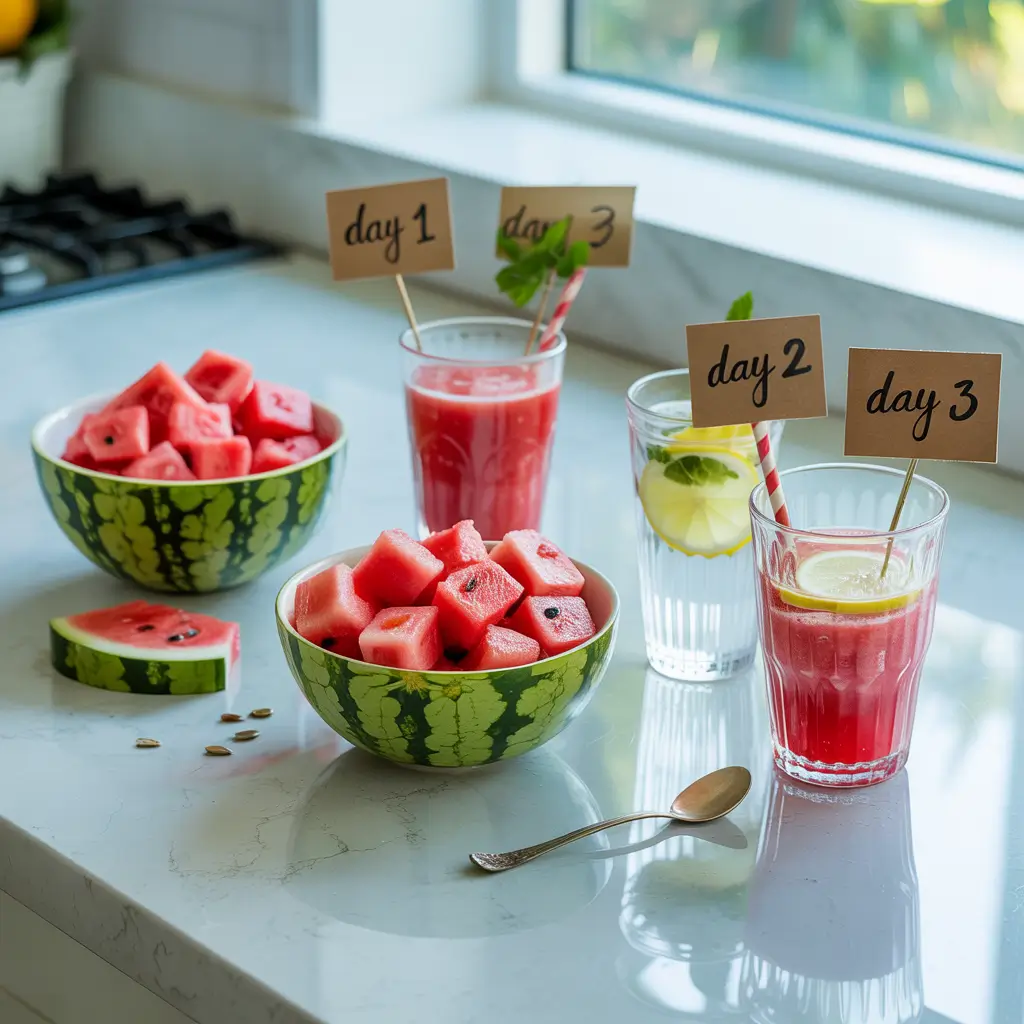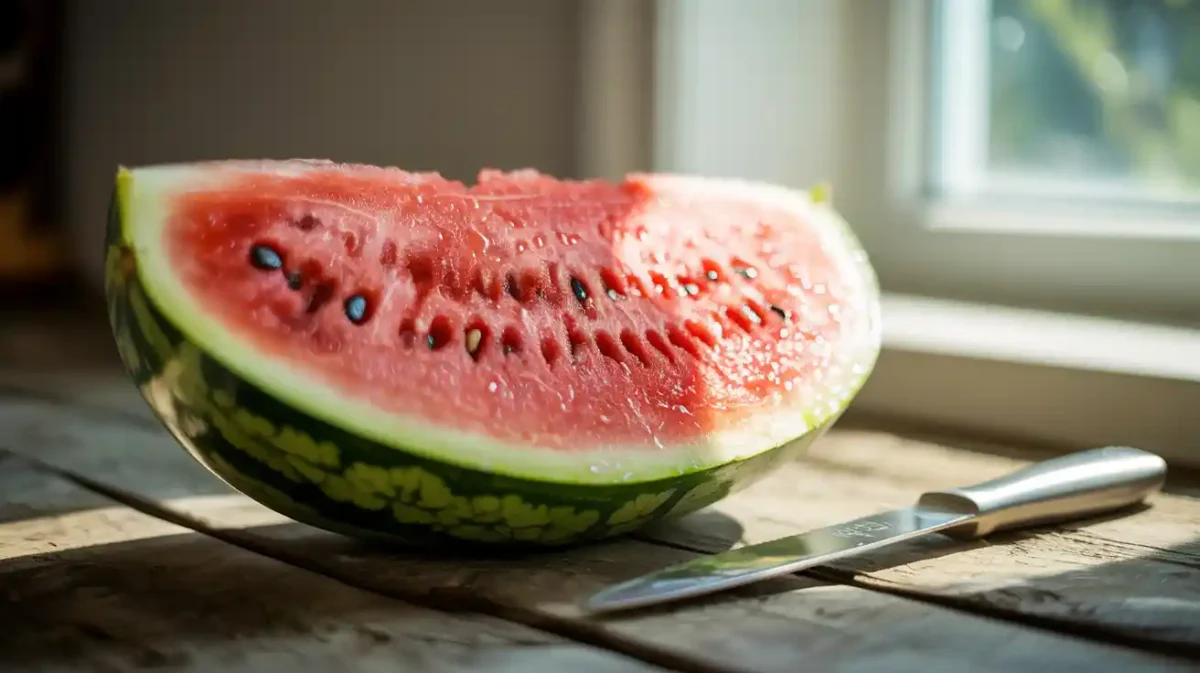Introduction
The watermelon cleanse diet has been making waves in the health and wellness world as a quick way to detox, shed water weight, and recharge the body. This short-term cleanse involves eating mostly watermelon for a set period, usually two to three days, to flush out toxins and reset digestion. Many swear by its hydrating power and refreshing taste, but the question remains—does it truly work as a detox, or is it just another fad diet?
In this guide, you’ll discover everything about the watermelon cleanse diet: its origins, how it works, nutritional benefits, potential risks, and a safe step-by-step plan you can try. We’ll also answer the most common questions people ask about this cleanse, like whether it actually helps with weight loss, what happens if you only eat watermelon for a couple of days, and how it compares to other detox diets.
Looking for inspiration? Try our Creami Recipes for Weight Loss.
Discover great ideas like HighTasty for more healthy food options.
table of contents
Table of Contents
What is the Watermelon diet?
Definition of the watermelon detox
The watermelon diet is a short-term eating plan where watermelon makes up the bulk—or sometimes the entirety—of what you consume for a set period, usually two to three days. Unlike long-term diets that require calorie counting or complex meal prep, this cleanse is simple: you eat fresh watermelon in controlled portions throughout the day, paired with plenty of water and, in some variations, light snacks such as cucumbers or herbal teas.
This type of cleanse appeals to many because it’s refreshing, hydrating, and easy to follow, especially during hot summer months when watermelon is in peak season. Supporters claim it helps reduce bloating, flush out toxins, and jump-start weight loss by cutting down on processed foods and giving the digestive system a break.
Historical Roots and Rise in Popularity
While the modern “cleanse” concept has only gained traction in recent decades, watermelon detox has been used historically in various cultures for its natural hydration and cooling effects. Ancient Egyptians, for example, consumed watermelon to stay hydrated in the desert heat, while traditional Chinese medicine considers it a food that clears heat and supports kidney health.
The watermelon cleanse diet became more mainstream with the rise of social media detox trends, where influencers began showcasing their short-term results. Today, it’s marketed as both a quick weight-loss tool and a gentle body reset, often compared to juice cleanses but with the added benefit of chewing whole fruit.
Don’t miss our refreshing Ninja Creami Protein Ice Cream for a balanced treat beyond fruit-only cleanses.
Nutritional Profile of watermelon diet

Calories, Vitamins, and Minerals in Watermelon detox
One of the main reasons the watermelon cleanse diet is so appealing is its impressive nutritional profile combined with its low calorie count. A one-cup serving of diced watermelon contains roughly 46 calories, making it an excellent choice for those watching their weight. Watermelon delivers a surprising boost of vital vitamins and minerals, all while staying refreshingly light in calories. It’s a rich source of vitamin C, which strengthens the immune system, and vitamin A, which supports healthy skin and eye health. You’ll also find potassium, an important mineral that helps regulate blood pressure and muscle function.
In addition, watermelon is a strong source of antioxidants like lycopene, the compound that gives the fruit its bright red color. Lycopene has been linked to heart health, reduced inflammation, and protection against certain chronic diseases.
Hydration Benefits and Sugar Content
Another unique benefit of watermelon diet is its extremely high water content—over 90% of its weight is water. This makes it a natural hydrator, which is one of the reasons it’s central to detox plans and summer diets. Staying hydrated supports digestion, improves energy, and helps the body naturally flush out waste.
That said, watermelon detox is also relatively high in natural sugars compared to some other fruits. While the sugars are naturally occurring, eating watermelon exclusively for several days may cause spikes in blood sugar for some individuals. Still, when consumed as part of a balanced cleanse, it offers more benefits than drawbacks.
Check out Best Protein Powders for Creami to see how you can balance fruits with protein for longer-lasting satiety.
Health Benefits of the Watermelon Cleanse Diet
Detox and Hydration Effects
One of the biggest selling points of the watermelon cleanse diet is its natural detox effect. Thanks to its high water content—over 90%—this fruit works like a natural diuretic, helping the body flush out excess sodium, toxins, and waste. This cleansing action may reduce bloating, improve digestion, and leave you feeling lighter within just a couple of days. Hydration also plays a crucial role in maintaining healthy skin, lubricating joints, and boosting energy levels, all of which can benefit from a short watermelon-focused cleanse.
Watermelon detox also contains citrulline, an amino acid that may improve blood flow and support kidney function. This is why many people view it as more than just a sweet snack—it’s considered a fruit that actively supports the body’s cleansing systems.
Weight Management Support
Another reason people try the watermelon cleanse diet is for weight management. Since watermelon is low in calories and fat while being rich in fiber and water, it helps promote a sense of fullness without adding excess calories. For those who struggle with portion control, substituting processed snacks with watermelon can naturally cut down calorie intake.
Of course, the weight loss results from a short cleanse are usually temporary and mostly linked to water weight. However, using watermelon detox as a tool to transition into healthier eating habits can provide long-term benefits.
Don’t miss our creamy yet healthy option: Ninja Creami Protein Ice Cream, a great treat after a light fruit-based cleanse.
Risks and Side Effects of Eating Only Watermelon
Potential Nutrient Deficiencies
While the watermelon cleanse diet may seem refreshing and beneficial in the short term, it’s not without drawbacks. One of the main concerns is nutritional imbalance. Watermelon is low in protein, healthy fats, and certain essential vitamins such as B12 and D. Relying solely on watermelon for multiple days can leave your body deprived of nutrients it needs for muscle repair, energy production, and hormone balance. Over time, this deficiency may cause fatigue, weakness, and difficulty concentrating.
For those with physically demanding lifestyles or who exercise regularly, the lack of protein can be especially problematic. Without adequate protein intake, your body may begin breaking down muscle for fuel, which is counterproductive to health and weight goals.
Sugar Spikes and Digestive Discomfort
Another risk of the watermelon cleanse diet is its natural sugar content. Although these sugars are far healthier than refined ones, eating large amounts of watermelon can still cause blood sugar spikes, particularly for individuals with insulin sensitivity or diabetes. This may result in energy crashes, headaches, or dizziness.
Additionally, watermelon diet is rich in fiber and water, which can sometimes cause bloating, diarrhea, or stomach cramps if consumed in excess. For this reason, it’s essential to listen to your body and avoid overindulging, even during a cleanse.
Explore Delicious Options with Our Dairy-Free Protein Pints that balance sweetness with nutrition for more sustainable results.
How to Follow a 3-Day Watermelon Cleanse diet Safely

Step-by-Step Plan
The watermelon cleanse diet works best when done for a short period—no longer than three days. During this time, the goal is to eat watermelon in small, frequent meals throughout the day to stay energized and hydrated. It’s important to drink plenty of water alongside the fruit and, if necessary, add light options like cucumber slices, herbal teas, or lemon water to avoid fatigue.
A balanced approach to this cleanse prevents side effects like dizziness or excessive hunger while still allowing your digestive system to reset. Always listen to your body and stop immediately if you feel weak or unwell.
Tasty Card Recipe Format: 3-Day Cleanse Menu
Day 1:
- Breakfast: 2 cups of watermelon cubes
- Snack: Fresh watermelon smoothie with mint
- Lunch: 3 cups of chilled watermelon slices
- Snack: Herbal tea with a side of watermelon chunks
- Dinner: Watermelon and cucumber salad with lemon
Day 2:
- Similar structure to Day 1, with optional cucumber or mint variations
Day 3:
- Repeat Day 1 or blend watermelon into smoothies for variety
This structured approach ensures you’re consuming enough water and fiber while limiting boredom.
For a boost of balance, check out Best Protein Powders for Creami to complement fruit-based cleanses with essential protein.
Watermelon Cleanse Diet and Weight Loss

Can Watermelon Really Help You Lose Weight?
The watermelon cleanse diet is often praised as a quick way to drop a few pounds, but it’s important to understand how this works. The majority of pounds shed on a cleanse come from water loss rather than actual fat reduction. Since watermelon is extremely hydrating and naturally low in calories, replacing heavier meals with this fruit reduces bloating and helps the body shed retained fluids. For someone looking to slim down before an event, it can create a leaner, lighter feeling in just a few days.
However, lasting weight loss requires more than a short cleanse. Once you return to regular eating, some of the lost weight may come back. That’s why nutritionists recommend viewing the watermelon cleanse as a short reset rather than a long-term solution.
Comparison with Other Detox Diets
Compared to juice cleanses or fasting, the watermelon cleanse diet offers the benefit of eating whole fruit, which provides fiber and satiety. Chewing solid foods also helps you feel more satisfied than just drinking liquids, making it easier to stick to. Still, just like other fruit-only diets, it lacks the balance of protein and healthy fats needed for sustained results.
Incorporating watermelon into a balanced diet—rather than relying on it exclusively—is a smarter approach for long-term weight management.
Looking for inspiration? Try our High Protein Low Fat Dessert Recipe to satisfy cravings without derailing your goals.
Best Combinations and Variations of the Watermelon Cleanse
Watermelon with Lemon, Cucumber, or Mint
While the watermelon cleanse diet is traditionally fruit-only, adding small variations can make it more enjoyable and sustainable. A popular twist is pairing watermelon with lemon juice. The tartness of lemon not only balances the sweetness but also provides an extra boost of vitamin C, which supports immunity and enhances detox effects.
Cucumber is another excellent addition. Similar to watermelon, it’s loaded with water and fiber, offering a light and hydrating boost throughout a cleanse. A watermelon-cucumber salad with a squeeze of lime is both hydrating and light, perfect for lunch or dinner. Mint leaves can also be added to smoothies or fresh slices to improve digestion and add a cooling flavor.
Smoothie Blends and Light Protein Options
For those who want more variety, blending watermelon into smoothies is a great way to change textures while still sticking to the cleanse. Adding fresh herbs, coconut water, or even chia seeds can make the cleanse more nutrient-rich.
If you’re looking for a slightly more balanced variation, some people include light protein sources like plant-based shakes or a handful of nuts once a day. This helps prevent muscle breakdown while still keeping the cleanse effective.
Discover great tips in our Dairy-Free Protein Pints, a sweet way to add balance to fruit-based diets.
Expert Opinions and Scientific Evidence
What Nutritionists Say About Fruit-Only Cleanses
Experts agree that the watermelon cleanse diet can be safe for most healthy adults if followed for a very short period—typically no more than three days. Nutritionists highlight its benefits for hydration and its role as a gentle digestive reset. However, they caution that the diet lacks essential nutrients like protein, fat, and certain vitamins. As a result, it’s not considered sustainable for long-term use.
Some dietitians compare it to juice cleanses, pointing out that watermelon has an advantage because you’re consuming whole fruit with fiber, which keeps you fuller and supports digestion. Still, they stress that fruit-only diets should be viewed as temporary and not a substitute for balanced eating.
Research on Watermelon’s Health Benefits
Scientific studies have shown that watermelon is rich in lycopene, an antioxidant associated with heart health and reduced inflammation. Research also supports its role in promoting hydration and improving recovery after exercise due to its amino acid citrulline. While these benefits make watermelon a valuable addition to any diet, there’s no strong scientific evidence proving that a watermelon-only cleanse eliminates toxins.
Most health professionals recommend enjoying watermelon as part of a balanced diet rather than relying on it exclusively for detox purposes.
Looking for inspiration? Try our Guide to Budget-Friendly Protein Snacks.
For daily wellness updates, follow us on Facebook.
FAQs
What happens if I only eat watermelon for 2 days?
In just 1–2 days, many people notice reduced bloating and a slimmer look—largely from shedding excess water, not fat. However, because watermelon has negligible protein, your body may begin breaking down muscle tissue to meet essential needs, especially if you’re active or haven’t eaten protein recently.Fox NewsNew York Post
Can I lose weight eating watermelon?
Yes—but the weight lost is mostly water and possibly muscle. Studies show that eating watermelon instead of higher-calorie snacks like cookies can modestly decrease body weight, BMI, waist-to-hip ratio, and blood pressure over several weeks. This is due to its hydration, low-calorie density, and ability to increase feelings of fullness.PMCWomen’s Health
What does eating watermelon for 3 days do?
A 3-day watermelon-only cleanse may result in short-term water loss, less bloating, and a temporary shift in appetite. But because it lacks essential nutrients—especially protein, fats, and vitamins—it can lead to fatigue, irritability, and hunger. It’s important to recognize that your body can’t absorb all needed nutrients when limited to watermelon alone.BetterMehealthline.com
Can I detox my body with watermelon?
Not in the way detox marketing claims. Your liver and kidneys naturally handle toxin removal, keeping your system clean without extra help. No scientific evidence supports the idea that eating only watermelon enhances detox beyond what your body does naturally. However, watermelon can support hydration and improve dietary quality when eaten as part of a balanced diet—not as a standalone cleanse.seasonhealth.comhealthline.comscitechdaily.com
Conclusion
The watermelon cleanse diet can be a refreshing way to reset your body, reduce bloating, and boost hydration. Its low-calorie, high-water content makes it a popular short-term detox option, helping many feel lighter within just a few days. However, experts stress that it lacks essential nutrients like protein and healthy fats, so it’s not a sustainable long-term solution.
If you decide to try it, limit the cleanse to no more than three days and transition back to balanced meals afterward. This way, you enjoy the benefits without the risks. Think of watermelon as a powerful addition to a healthy diet, not a replacement for complete nutrition.
Discover more balanced diet hacks in our How to Fix Crumbly Ice Cream.

